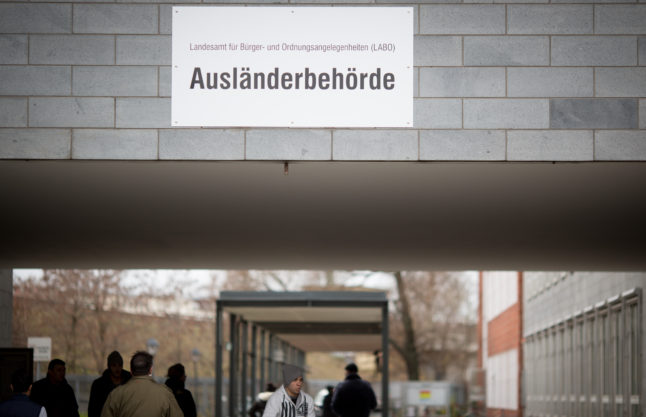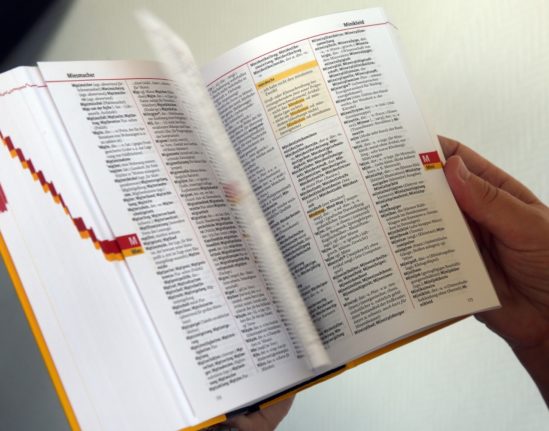After years of waiting, the end appears to be in sight for foreigners who are eager for Germany's new citizenship law to come into force.
Passed in cabinet on August 23rd, the bill now needs to be voted on in both the Bundestag and Bundesrat this autumn before it can enter into force.
Once it does, as most people are aware, foreigners will be able to naturalise much more quickly than before and will also be able to keep their previous nationalities when they do. However, as this fascinating reform nears the finish line, we thought we'd take you through six of the more surprising aspects of the legislation.
'German' children may have to apply for citizenship
The new draft law foresees a quicker route to citizenship for the children of foreigners. In future, children will automatically gain German citizenship once their parents have been in Germany for five years as opposed to eight - and they will also be able to keep any existing citizenships they have.
However, things look slightly different for another set of second-generation migrants - that is, the children of immigrants.
Under current rules, the children of migrants have claim to German citizenship if at least one parent is German or if their foreign parents have lived in Germany for at least eight years. However, those who held another non-EU nationality and were born after the January 1st, 2000, previously had to choose between the two citizenships at the age of 21. (Incidentally, people who grew up in a foreign country but have at least one German parent still have to make this choice.)
According to Interior Minister Nancy Faeser (SPD), those who decided in favour of the other nationality will now be able to get a German passport (provided they still fulfil the criteria). But - and this is key - they will have to go through the naturalisation process just like everyone else.
That means supplying citizenship tests, proof of income, birth certificates, health insurance, proof of residency and the rest - even if they were born and grew up here.
READ ALSO: When is my child entitled to German citizenship?
No plans for speeding up the process
The backlog at Germany's beleaguered citizenship offices is no secret, with people in some states waiting as long as a year just for an initial telephone appointment.
With the government on track to massively ease the rules for applying, there are concerns that these offices will be completely overwhelmed with applications and have no way of tackling the backlog.
You might expect the government to have laid out concrete plans for this as part of their naturalisation reforms - but from the statements made by Nancy Faeser in a press conference on Wednesday, it seems like the opposite is true.
 People go in and out of the Ausländerbehörde in Berlin. Photo: picture alliance / Kay Nietfeld/dpa | Kay Nietfeld
People go in and out of the Ausländerbehörde in Berlin. Photo: picture alliance / Kay Nietfeld/dpa | Kay NietfeldIn fact, Faeser brushed aside the concerns as Ländersache - an issue to be dealt with by the federal states and the local districts rather than the federal government. It was understandable that the states needed support, she said, but ultimately it was up to them to make plans to smooth the process for migrants.
READ ALSO: Why more and more German citizenship applicants are suing Berlin authorities
Tough rules on financial independence
While the new naturalisation law has generally been viewed as a liberalisation of current rules, there are some significant ways in which the legal framework has got tougher. One of the most controversial is a change of wording that effectively bans people receiving government support like Bürgergeld (formerly Hartz IV) from gaining citizenship.
This is partly the case under current rules, but there are key exceptions for people who are unable to find work - e.g. people with disabilities or caring commitments - so naturalisation while on benefits is technically still possible. These will no longer apply when the new law comes in, though there will be carve-outs for certain groups of the populations, including the so-called guest-worker generation.
Nancy Faeser also promised that people with young children could potentially still be eligible, even if receiving state support.
READ ALSO: Who qualifies for German citizenship under the new draft law?
However, the law doesn't generally take into account a variety of other circumstances in which someone may not be able to work full-time, such as student or carer status. This surprisingly tough amendment wasn't in the original law but was snuck into the second draft with the input of Justice Minister Marco Buschmann (FDP). Would-be citizens should be integrated "economically" as well as socially, the FDP politician said at the time.
Some people won't need language tests
Under the reformed citizenship law, it's interesting to note that the language requirements for citizenship will still remain the same for most people. For the ordinary route to naturalisation after five years, a B1 language test will be required, just as it is currently for people who apply after eight years.
 A woman consults the Duden German dictionary. Photo: picture alliance/dpa | Wolfgang Kumm
A woman consults the Duden German dictionary. Photo: picture alliance/dpa | Wolfgang KummBut one key change will dispense with formal language tests for anyone aged 67 and older - a change primarily targeted at members of the guest worker generation but that will apply to everyone. There will also be a hardship clause for people who face barriers to learning German - for example those who care for elderly relatives.
For both of these groups, simply being able to communicate with the authorities throughout the process will suffice as evidence that their German is good enough for naturalisation.
No special path for the highly qualified
Germany's overhaul of citizenship regulations is often mentioned alongside the forthcoming skilled worker immigration law as a package of reforms designed to encourage a fresh cohort of qualified workers into the country.
Introducing the draft at a press conference on Wednesday, August 23rd, Faeser told the assembled journalists that Germany was in "urgent" need of skilled workers in the economy and was competing for the best minds in the world.
"We’ll only win the best minds in the world if they can become full and complete members of our society in a foreseeable amount of time, with full democratic rights," she said. "Only people with the prospect of becoming German and of finding a true home for themselves and their families will decide in favour of Germany."
But when questioned by a reporter, the Interior Minister revealed that there would be no special routes available for skilled workers to get fast-track citizenship like there is with permanent residency. (Blue Card holders can get it after just three years in some cases.)
Instead, skilled workers will be subject to the same tough criteria as other people if they want to get hold of a German passport in three years rather than five: C1 German (the second highest level) and evidence of special integration such as exceptional career achievements or service in the community.
READ ALSO: What’s the difference between B2 and C1 German for new fast-track citizenship?
Reforms are partly about historic justice
While there is clearly an economic incentive behind the bill - namely, encouraging well-qualified people to stay in Germany long-term for work and pay their taxes here - there is also another important backdrop to the landmark reforms.
This context was mentioned several times in Faeser's press conference, most notably in an impassioned answer to a journalist who criticised the lower language requirements for older immigrants, including those from the guest worker generation.
Back in the 50s and 60s when this generation of workers came to Germany, there were no integration courses or language courses to help them settle in, Faeser said. They were brought over to Germany with a view to sending them back home as soon as possible, she explained, which is why there was no effort made to help people integrate or settle in long-term.
 A Turkish guest worker paints a car at the Ford factory in Cologne. Photo: picture alliance/dpa/Ford-Werke GmbH | Ford-Werke GmbH
A Turkish guest worker paints a car at the Ford factory in Cologne. Photo: picture alliance/dpa/Ford-Werke GmbH | Ford-Werke GmbHThat's despite the fact that, In the words of the Interior Minister: "German industry would be unthinkable without these people".
READ ALSO: HISTORY: What’s behind the push to reform dual citizenship laws in Germany?
In many ways, the citizenship bill is an attempt to right some of these historic wrongs - whether it's by lowering language requirements or offering dual nationality as a route into German society for people who have lived here for decades.
As well as being a pragmatic piece of legislation, in other words, members of the traffic-coalition - and particularly the SPD - see it as a moral imperative.

Comments (3)